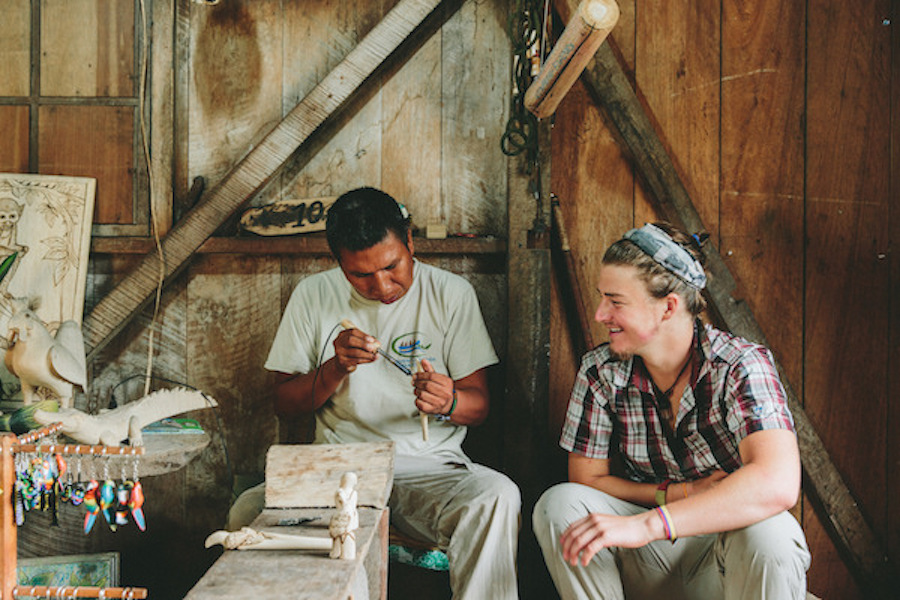Why Global Citizens Need to Be Our Future Leaders

Imagine a world led by lifelong learners who blend confidence and humility, strength and vulnerability, head and heart. Leaders who reflect and represent our diversity, who put curiosity before judgment, and who see humanity’s greatest challenges as our greatest opportunities.
Given current headlines, I realize this might sound far-fetched; but I’m convinced that this world is well within reach.
How do we get here? It starts by defining what today’s leaders most need to learn, and re-designing education around those skills and characteristics.
My passion for this work runs deep.
When I graduated from high school, I was hungry to find a deeper sense of purpose for my higher education (and my life!) before setting foot on a college campus. I’d been a good student and had been admitted to Stanford University, but there was something missing that felt both urgent and important. I was desperate to understand what got me out of bed in the morning when there was no alarm clock, and who I was when I was outside of my comfort zone. I called the Peace Corps, but they turned me down (because you need a college degree to join). It struck me as ironic that there were opportunities for 18-year-olds to join the military or go on a religious mission, but there was no way for me to spend a year abroad as a civilian in a secular capacity, outside a few boutique and expensive travel programs.
So, like most of my peers, I went straight to college. But, after two more years of classroom learning, and a persistent feeling like I was only acting the part, I knew I needed a break. I wanted to test what I was learning in the classroom in the real world.
I “stopped out” of school and moved to Brazil with a backpack and a slip of paper with the name of an NGO that might take me in as a foreigner with no Portuguese. This was the beginning–learning through trial and error, failure, rebound–of the most formative part of my education, and it had nothing to do with my formal education. I learned to speak to people in their own language, and to see the world—and our country—through others’ eyes. Most importantly, the experience unlocked the question I’ve been on a mission to answer ever since: What if every young person had the opportunity to leave home, be humbled and move from “they” to “we”?
This is why I built and run Global Citizen Year, a non-profit that uses the power of a global immersion between high school and college to unlock curiosity, conviction, and courage in our next generation leaders. Each year we identify exceptional high school graduates at the critical moment when they have the maturity to leave home but are still forming their values and identity. Through an intensive rite of passage that wraps coaching and curriculum around lived experience, we help our Fellows step off the treadmill of achievement and into an immersive experience far from home. Living in communities across Asia, Africa, and Latin America, they are stripped of the comfort and familiarity of their language, culture, and status and have no choice but to grapple with questions that were drowned out by the busy-ness of high school. Over the course of a school year, we guide our Fellows on a journey to understand who they are when they’re outside their comfort zone, what makes them happy when nobody is watching, and what gets them up when there’s no alarm clock. By staying longer and going deeper than traditional fly-by travel, they also connect with something much bigger: they discover what ignites and breaks their hearts
If you’re a parent, you probably know that college is the biggest single investment you’ll make in your child’s life, and yet the vast majority of young people go to college with no clear purpose and no clue how to use the experience. The result? Research shows that just 3% of students have the kind of transformative experience in college that fosters personal success and happiness. While 97% flounder, those who stand out and thrive do so because they have developed specific muscles: initiative, drive, and agency. They seek out mentors, chase down internships and stick with things, even (and especially) when they’re hard.
By shuttling young people along a conveyor belt from high school to college to careers, we’re ensuring that most kids will never have a chance to step back and consider their lives from a broader perspective. Life’s most important questions, like “How do I deal with ambiguity and failure?” “Who am I when no one is watching?” “What are my strengths and how can I build a meaningful life?” aren’t answered in a classroom or in the boardroom. And while it might feel efficient to push these questions aside in the first half of life eventually, they’ll come back to find (if not haunt) us.
Our narrow definition of success has implications beyond individual well-being: we’re training young people to play small and safe, advancing themselves and their careers rather than committing themselves to addressing the bigger questions and challenges facing humanity. As inequality widens, pandemics rage, and global temperatures rise, the greatest minds of our time are being recruited to optimize online ads, and to develop more apps to solve trivial first world “problems.” Something is wrong with this picture.
It’s time to forge a new path where the gold-stars, quick wins, and promotions are replaced by something less measurable, but far more meaningful. By re-orienting education around the skills that are uniquely human—curiosity, conviction, and courage—we can launch the leaders the world needs now.
For more information on Global Citizen Year, go to www.globalcitizenyear.org/.


